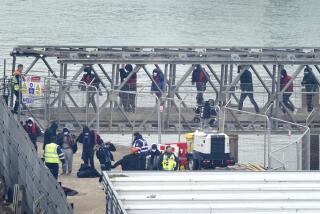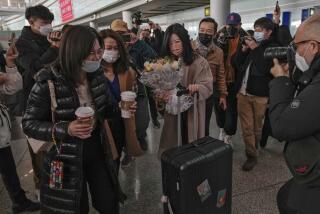China Tries to Bar Its Viet Refugees From Hong Kong
- Share via
BEIJING — Authorities here have issued orders to four southern provinces that ethnic Chinese refugees from Vietnam who have been resettled in that part of China be stopped from sailing to Hong Kong, the official New China News Agency reported Sunday.
China’s State Council, which oversees the executive branch of the central government, told the provinces--Guangdong, Guangxi, Fujian and Yunnan--to punish people who encourage refugees to leave, to quash rumors that Hong Kong is granting amnesty and to step up coastal patrols, according to the news agency’s report.
The action comes in response to urgent pleas by officials in Hong Kong, where more than 6,000 “boat people” have arrived since July 1.
Temporary Housing
The refugee flow hit a peak last week when about 2,000 arrived, mostly in small, motorized wooden boats.
Two ferries anchored in Hong Kong’s scenic harbor temporarily house many of the latest arrivals, while other refugees are staying in hastily established detention centers.
Hong Kong and Chinese officials say the influx has been fueled by rumors that refugees could stay in the colony or resettle in the West, even though Hong Kong’s policy is to send them back to China.
Hong Kong officials are scheduled to meet with top Guangdong province officials in Canton on Tuesday to discuss repatriation, a process that can take six months or longer. However, lower-level Guangdong officials have been quoted as saying that the only way to stop the flow is for some of the refugees to be sent back immediately.
Hopes for a Better Life
China granted asylum to about 280,000 ethnic Chinese who fled northern Vietnam in 1978 and 1979, when relations between the two Communist neighbors soured, sparking a brief border war. Most of the refugees were resettled on state farms in the southern provinces, and it is primarily these people--dissatisfied with the poverty and hardships in the south--who are now seeking to reach Hong Kong in hopes of a better life.
Xu Jiatun, who as head of the news agency’s Hong Kong office functions as the top Chinese representative in the British colony, was quoted in the report as saying that the State Council regards control of the refugee flow as “a matter of the utmost importance.” With one of the highest population densities in the world, Hong Kong has tried hard to avoid permanently accepting large numbers of refugees.
Xu was also quoted as saying that China has already stopped more than 4,000 refugees from leaving, but he did not elaborate. This supports recent statements from Chinese officials in Hong Kong who have said that provincial authorities are launching intensive measures to cut the flow.
Discussions Under Way
Hong Kong Gov. David Wilson said last week that British officials were aware of the problem of the refugee influx and that urgent discussions were under way with Chinese authorities.
Arrivals in Hong Kong of boat people from Vietnam peaked during the first seven months of 1979, when 66,000 sailed in on fishing junks and freighters. Hong Kong and the rest of the world accepted them as refugees escaping persecution from the Communist government that took over at the end of the Vietnam War. Most of them were resettled in the West, a large number ending up in Southern California.
Each year since then, a few thousand refugees from Vietnam have sailed into Hong Kong, but U.N. officials have found it increasingly difficult to find countries willing to accept them. As a result, about 9,000 boat people are languishing in Hong Kong refugee camps.
Some refugees who arrived last week told reporters that Chinese officials knew where they were going yet still allowed them to leave.
Journeys Long and Short
One woman, holding a toddler as reporters shouted questions from outside the fence of an emergency holding center, said she had made a seven-day journey from Guangxi province, which borders Vietnam. Many other refugees have made short trips from Guangdong province, which is adjacent to Hong Kong.
Hong Kong television last week broadcast footage showing a group of refugees setting off from a coastal village a few hours’ sail from the colony. The report said that the refugees had openly bought their boat for about $1,350.
Under existing arrangements, China takes refugees back only after determining where they came from--a lengthy process. None of the refugees who have arrived since July 1 have yet been sent back, and Hong Kong officials say this has contributed to the problem.
More to Read
Sign up for Essential California
The most important California stories and recommendations in your inbox every morning.
You may occasionally receive promotional content from the Los Angeles Times.













